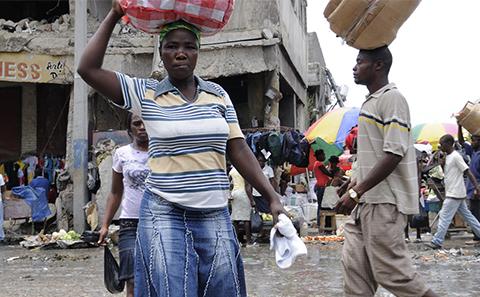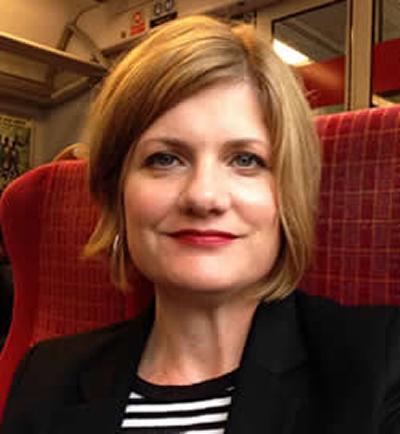Calling the shots for women in film
Highlighting the role of women in the UK film industry
In October 2020 Dr Shelley Cobb ─ the academic featured in this article ─ appeared as a guest on the University's podcast, Universi-tea, to share more about what motivates her to campaign for equality in the film industry.
In the podcast episode, she discusses taking the research project further and its impact on film culture, shares her favourite female-focused films, and speaks about her own career path.
Listen to Shelley on 'The Feminist Film Fanatic' below, or find all Universi-tea episodes online.
Calls for women’s equality in the film industry have been at the forefront of the media recently, with campaigns and movements rising up on the red carpet and making headline news.
A Southampton research team is highlighting the role of women in the UK film industry and the obstacles they face. During the four-year project, entitled ‘Calling the Shots: Women and Contemporary Film Culture in the UK’, the research team collected data from British films made between the years 2000 and 2015. For each film, they recorded the number of women in six key ‘behind the scenes’ roles: director, writer, cinematographer, editor, producer and executive producer.
They found that across 3,452 films in production in the UK between 2003 and 2015, only 14 per cent of all directors and seven per cent of all cinematographers were women. Furthermore, just one per cent of all directors and 0.3 per cent of cinematographers were women of colour.
There is an entrenched system of power in the film industry, in which the people who get power tend to support people who are just like them. There are well-trained, experienced, and talented women filmmakers working now who should be at the top of their careers but they have been left aside by the gatekeepers, tastemakers, and financiers who need to change and learn how to make equality a reality.
The team also interviewed 50 women in key filmmaking roles. Interviewees included directors Amma Asante (Belle), Gurinder Chadha (Bend It Like Beckham), and producer Sarah Curtis (Mrs Brown; Run, Fatboy, Run; The Awakening). These interviews will join the data-led reports in an archive available to future researchers, film industry personnel and related institutions, and the public.
Shelley is joined by Research Fellow Dr Natalie Wreyford, who brings industry expertise from her extensive career in the British film industry. “I first raised the issue of gender inequality on British films in 2006 while I worked as a Senior Development Executive at the UK Film Council and little has changed since then, unfortunately,” says Natalie.
The #MeToo moment shows that it is time to stop putting individual ‘creative’ men on a pedestal. Instead, we must better understand the power dynamics in the film labour market, and ditch the assumption that white men are dominating because they are somehow ‘better’ than everyone else
“The film world is not the meritocracy it professes to be, and it is time to hugely expand and diversify the pool of people who get to make films,” she explains.
Communicating the research to the wider community – through impact events that aim to open up public discussion – is an important part of this project. Shelley and Natalie, along with Co-Investigator Professor Linda Ruth Williams from the University of Exeter, have spoken at the Institute of Contemporary Arts, the British Film Institute (BFI), on BBC Radio 4 Woman’s Hour and at various UK universities. In May 2018 they presented their latest data at the 71st Cannes Film Festival as well as organising the Women’s Film and Television History Network fourth biennial conference, which they hosted in Southampton.
Since the team shared their findings, the BFI has committed to 50:50 gender targets for all the films they fund. Shelley hopes the impacts of this research will be even more widespread: “Sharing our data, which is also supported by other findings from organisations such as Directors UK, means that institutions are at least having to respond. So my hope is that in the near future we will start to see a long-overdue shift towards better gender equality in our film industry.”
‘Calling the Shots: Women and Contemporary Film Culture in the UK’ is funded by the Arts and Humanities Research Council. Project partners include the British Film Institute; the media and entertainment union, BECTU; Women in Film and Television UK; and the Shetland Film Festival.
Key facts
- Fourteen per cent of directors and seven per cent of cinematographers were women across 3,452 UK films in production between 2003 and 2015. Just one per cent of all directors and 0.3 per cent of cinematographers were women of colour.1
- Overall inclusion of women in UK films is worse than in the top 250 films released in the USA. 1
- Women make up 24 per cent of directors on co-productions with other countries, but just 11 per cent on domestic UK films. 1
- A quarter of the 203 British films in production in 2015 had no women in any of the six key production roles (director, writer, producer, executive producer, cinematographer, and editor). 1
- More than half of British films in production in 2015 have just one or no women in any of the key roles, compared to less than a third on the top grossing films in the US.2
1 Findings from Calling the Shots: Women and Contemporary Film Culture in the UK
2 Annual Celluloid Ceiling report from San Diego State University
Find out more information
Calling the Shots: Women and Contemporary UK Film Culture website
Follow us on Twitter: @WomenCallShots
Related Staff Member
You may be interested in:

Putting vulnerable people on the map
Cutting-edge spatial data is giving people their basic human rights

Finding solutions for silver shoppers
Improving the retail environment for older people in the UK and China.

Challenging population perceptions
Understanding the facts about population change
